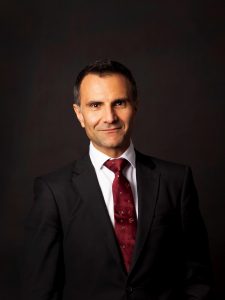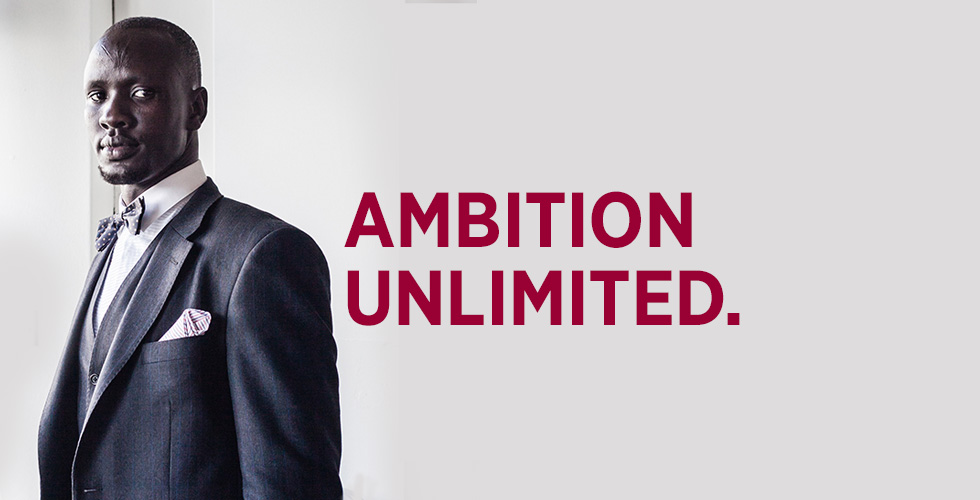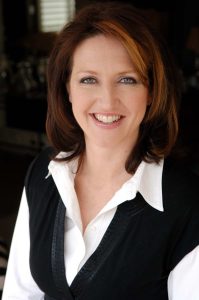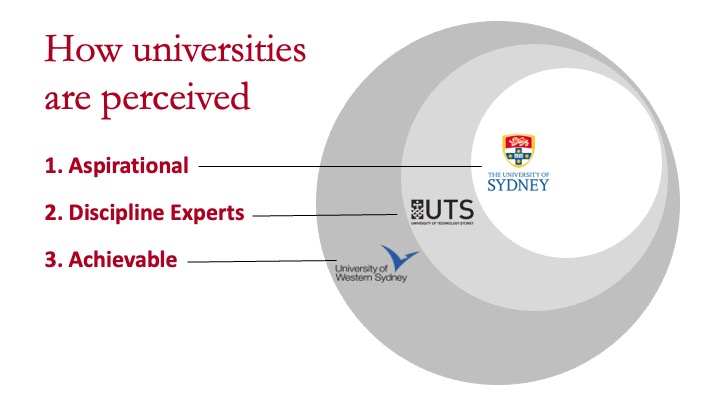26 Case Study: Using customer insights to reposition Western Sydney University
Jacki Montgomery
Introduction
Western Sydney University is considered a ‘young’ university, having been established in 1989. It is globally renowned for its excellence in teaching and research [1]. However, only a decade ago, its local identity was proving a challenge. It was then called the ‘University of Western Sydney’, and research showed that parents and prospective students could not really define what the university stood for, nor did they consider it their first choice. In 2015, the marketing team set out to challenge these perceptions of the university and undertook a bold rebranding campaign. It was an unprecedented success – deeply founded on consumer insights.
Determining the scope of the challenge
 As Head of Marketing at the University of Western Sydney, one of Angelo Kourtis’ main responsibilities was to increase student enrolments. Although enrolments had remained consistent, he believed that there was a significant opportunity to increase numbers. He and his colleagues were aware that many students in the local region chose to travel past the University of Western Sydney, to study at universities much further away from home. Previous advertising campaigns for the University of Western Sydney had promoted the quality and location of the university in order to attract students. Rather than continue with this approach, Kourtis believed that the team needed to conduct in-depth research and explore the reasons why local students were choosing to enrol at other universities.
As Head of Marketing at the University of Western Sydney, one of Angelo Kourtis’ main responsibilities was to increase student enrolments. Although enrolments had remained consistent, he believed that there was a significant opportunity to increase numbers. He and his colleagues were aware that many students in the local region chose to travel past the University of Western Sydney, to study at universities much further away from home. Previous advertising campaigns for the University of Western Sydney had promoted the quality and location of the university in order to attract students. Rather than continue with this approach, Kourtis believed that the team needed to conduct in-depth research and explore the reasons why local students were choosing to enrol at other universities.
Initially, Kourtis felt that the University’s positioning was ill-defined; that it really didn’t stand for anything that resonated with the region or more broadly in Sydney. He engaged a Market Research Agency, and they conducted qualitative research (which later informed the design of the quantitative study to verify the initial findings). The team held focus groups with participants who were considered to be important stakeholders in the decision-making process, and/or who had already been through the process of choosing a university: prospective students, current students, members of the community, employers, high school teachers and career advisors. The research produced two key insights.
Insight 1: Perception of the University of Western Sydney (compared to other universities)
The researchers asked participants to group a number of Sydney universities into segments, and then asked them to describe those segments. The first segment was called the ‘Aspirational Universities’, and in this group, participants placed longstanding, brownstone universities which often required high marks to enrol, and described them as status symbols. The second segment was called ‘Discipline Expert Universities’, which participants recognised as universities known for their strength in particular disciplines – seen as important if you wanted to secure a career in one of those discipline areas. The third segment was labelled ‘Achievable Universities’ – meaning ‘safety-net universities’, or the choice that you make when the other universities don’t accept your application. The University of Western Sydney was most often included in the third segment. Kourtis felt that this was inaccurate, and that for too long, the university had allowed itself to be defined by others. It strengthened his resolve to change this consumer perception and move the university out of the ‘Achievable’ segment.
Insight 2: Perceptions of Western Sydney, and the desire to distance from the region
The other key insight that emerged from the research was the impact of negative perceptions of Western Sydney on students’ choice of university. Whilst many of the research participants lived in Western Sydney, they did not want to identify with Western Sydney because of the stigma associated with the region. Public and media discourse up until that point had very much been about the deficit perspective of Western Sydney, and young people in particular wanted to distance themselves from it. So quite often, the choice they made about which university to attend was not about the university itself, but more a statement about the region. Whilst the region of Western Sydney does tend to suffer greater socio-economic disadvantage than other parts of Sydney[2], the insight that these perceptions of the region significantly affected students’ choice of university was unexpected.
The campaign idea, informed by insights
 Rather than shy away from these insights, Angelo Kourtis and his team confronted the negativity head-on. The campaign idea, informed by the key insights, spoke to taking pride in the region and ‘owning’ Western Sydney (including re-naming the university to Western Sydney University). It also challenged future students and other stakeholders to think differently about the University. Fortini-Campbell [3] describes making a connection between consumer insight and brand insight in advertising as ‘hitting the sweet spot’. That is, communicating an idea so powerful that the consumer feels that ‘they really understand me’.
Rather than shy away from these insights, Angelo Kourtis and his team confronted the negativity head-on. The campaign idea, informed by the key insights, spoke to taking pride in the region and ‘owning’ Western Sydney (including re-naming the university to Western Sydney University). It also challenged future students and other stakeholders to think differently about the University. Fortini-Campbell [3] describes making a connection between consumer insight and brand insight in advertising as ‘hitting the sweet spot’. That is, communicating an idea so powerful that the consumer feels that ‘they really understand me’.
The message from Western Sydney University was that it doesn’t matter where you’ve come from, it’s where you’re heading that is important. That is, your potential is not limited by your history, or how others may perceive or define you. And, importantly, that Western Sydney University will help you realise that potential.
The campaign execution
To demonstrate how Western Sydney University unlocks potential, Kourtis and the Creative Agency focused on individual journeys of alumni that encapsulated the sense of being ‘unlimited’. One of those journeys was that of Sudanese former child soldier, Deng Adut. Fleeing war-torn Sudan, the teenager was taken in by a family in Western Sydney, and despite having little English, he took on part-time jobs, studied hard, and won a scholarship to study Law at Western Sydney University. Adut is now a successful defence lawyer and refugee advocate. His story illustrated the idea that you can come from anywhere, and succeed on your own terms; that you can be unlimited in your potential. The 90-second film, which included re-enactments of war scenes and courtroom drama, was launched on social media, and received 3 million views within 7 days. The film was viewed in over 56 countries, and was picked up by local and international broadcasters – increasing views to over 5 million.
Post-campaign success
Not only did the campaign receive global accolades and awards, it effectively changed negative perceptions. The insights drawn from research played a crucial role in informing a campaign that dramatically transformed how future students viewed the university. It was a bold refusal to allow others to define the region and the institution. Western Sydney University saw an immediate uplift in student enrolments, and attitude surveys reflected positive shifts in perceptions amongst key stakeholders. The University now owns the powerful positioning of ‘unlimited’ in the education sector, and continues to reinforce the idea that if you are willing to work hard, be bold and ambitious, Western Sydney University will empower you to reach your unlimited potential.
Discussion questions
-
- What does ‘unlimited potential’ mean to you? Does it resonate? Do you find it inspirational? Why or why not? Discuss as a group. You may discover some insights about your peers, and the way they perceive the value of tertiary education.
- Think of a campaign that gives you that feeling: ‘they really understand me’ (perhaps a skin care brand, a car brand or a tech brand). Why did it make you feel that way? Was it a combination of consumer insight and brand insight?
About the chapter author
 Dr Jacki Montgomery is a Lecturer in Advertising at Western Sydney University. With an academic background in marketing and advertising, she is keenly interested in the dexterity of language and the profound role that insight can play in advertising campaigns. She frequently speaks at academic conferences, and has presented at creative industry events, including Semi Permanent and Mumbrella. Jacki is recognised both nationally and internationally as an exceptional communicator and teacher, and was recently awarded Western Sydney University’s Teacher of the Year.
Dr Jacki Montgomery is a Lecturer in Advertising at Western Sydney University. With an academic background in marketing and advertising, she is keenly interested in the dexterity of language and the profound role that insight can play in advertising campaigns. She frequently speaks at academic conferences, and has presented at creative industry events, including Semi Permanent and Mumbrella. Jacki is recognised both nationally and internationally as an exceptional communicator and teacher, and was recently awarded Western Sydney University’s Teacher of the Year.
About Angelo Kourtis
 Angelo Kourtis has been a member of the Western Sydney University community since 1986, as a student, graduate and as a member of staff. He held a number of senior marketing roles before being appointed to the position of Pro Vice-Chancellor (Students) in October 2011 and Vice-President, People and Advancement in March 2015. He leads the Offices of Student Experience and Marketing; People; Engagement and Advancement; and Student and University Planning – the latter including Competitive Intelligence and Analytics and Student Administration.
Angelo Kourtis has been a member of the Western Sydney University community since 1986, as a student, graduate and as a member of staff. He held a number of senior marketing roles before being appointed to the position of Pro Vice-Chancellor (Students) in October 2011 and Vice-President, People and Advancement in March 2015. He leads the Offices of Student Experience and Marketing; People; Engagement and Advancement; and Student and University Planning – the latter including Competitive Intelligence and Analytics and Student Administration.
Angelo conceived and established the student lifecycle strategy at the University, revealing invaluable insights into the ‘journey’ students embark on when aspiring to higher education and beyond. He pioneered the concept of the ‘Citizen Scholar’ and led the establishment of ‘The Academy’ at the University. He was the architect of the University’s rebranding strategy which has attracted national and international critical acclaim and precipitated a series of transformation programs in the digital, analytics and student experience domains.
Media Attributions
- Angelo Kourtis photo © Western Sydney University is licensed under a CC BY-NC-ND (Attribution NonCommercial NoDerivatives) license
- Perceptions image for case study © Jacki Montgomery is licensed under a All Rights Reserved license
- Deng Adut picture © Western Sydney University is licensed under a All Rights Reserved license
- Jacki Montgomery photo © Jacki Montgomery is licensed under a CC BY-NC-ND (Attribution NonCommercial NoDerivatives) license
- Times Higher Education 2023, World university rankings, <https://www.timeshighereducation.com/world-university-rankings/western-sydney-university> ↵
- Australian Bureau of Statistics 2016, Socio-economic indexes for areas (SEIFA), <https://www.abs.gov.au/ausstats/abs@.nsf/mf/2033.0.55.001>. ↵
- Fortini-Campbell, L 2017, Hitting the sweet spot: how consumer insights can inspire better marketing and advertising, The Copy Workshop. ↵


